Lucy in the Sky of Large Language Models
How infinite music breeds a culture of Beatle-heads
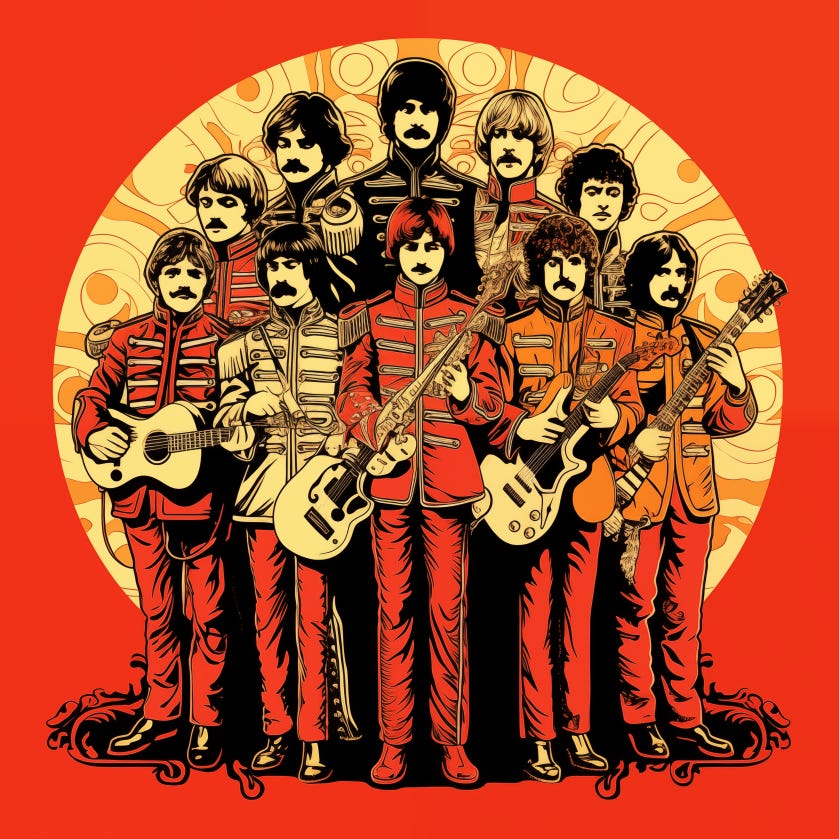
How can life go on if machines create 75 billion versions of Wild Honey Pie, the worst Beatles song in recorded history?1
When people imagine the future of AI music, their fear takes the form of a “totally autonomous agent,” posing as a “creator,” generating “not one song, a hundred songs, or a thousand songs,” but “billions of songs” using analytics to “test their way into what may work” (quote from the CEO of Spotify). The volume is dizzying, the method alienating. Sounds like the death of music culture to me… but maybe this is the wrong model.
Instead, imagine how the hardcore fans will use it. The 1% of the 1%–the obsessive, near-freakish scholar-monks who read into the secret meanings behind every word–will soon have the ability to imitate their heroes.
AI will elevate fan fiction to the point where it’s indistinguishable from the source. Weird…
Up until now, fan fiction has been an illegitimate half-breed, a sub-genre of pale imitations for nerds. It’s amateurish because it takes tremendous time, capital, networks, and expertise to make a timeless work of art. Given the limited resources, the average teenager might just write out their George Harrison sex fantasies and upload them to Wattpad. But the next generation of Beatles fans? They’ll have Lennon-McCartney co-write hits based on their journals, with everything mixed by an immortal George Martin (their sound engineer, “the fifth Beatle.”)
If you enabled 15,000 hardcore fans to join the Beatles, what kind of cultural ripple could that make?
This is the angle I’d like to explore the future of AI music through. It isn’t doomerism, and I hope it doesn't come across as coked-up techno-optimism either– it’s a specific thought experiment through the microcosm of the Beatles.
The Limits of Fan Fiction_
I’ll start with a confession: I am a Beatles nerd, perhaps to a degree that you didn’t know was possible. I’ve had the Beatles discography on repeat for the last 15 years. Getting high and actively listening to the details and messages2 in their music was perhaps the defining rite of passage of my college years. As popular as they obviously are, I’d wager I’m in the upper 1% of the 1% of their fanhood. They’re a big part of my identity. Bigger than New York, or Greek Orthodoxy, or maybe even writing itself. I can identify most songs from a one-second isolated drum track, listen to their outtakes, reverse engineer their songwriting, and know the obscure histories behind each song…
(…Lucy in the Sky of Diamonds was inspired by a hallucinatory chapter in a Lewis Carol book, and titled based on a scribble from Lennon’s 4-year old son. The fact that it’s code for “LSD” is a coincidence. Lennon ended up hating the song, in fact he thought Sgt. Peppers as whole was a sham of a concept album…)
There’s no name for a Beatles fan that is unreasonably enthusiastic. The cult members of the Grateful Dead are called “deadheads,” so I guess you could call me a Beatle-head.
Similar to how porn addicts get progressively into harder and weirder stuff, so do Beatle-heads. After you memorize their albums, there’s nowhere left to go but fan fiction.
I watched “The Rutles: All You Need is Cash,” a mockumentary about the Fab Four (Dirk, Nasty, Stig, and Barry), created by one of the members of Monty Python.
I listened to “Everyday Chemistry,” a bootleg album that spliced together the hits from their solo careers, marketing itself as a stolen cassette tape from a parallel universe where the Beatles never broke up.
It gets weirder: the thickest book I own is “The Memoirs of Billy Shears,” a 672 page confessional memoir from the man who claims to have replaced Paul McCartney after he died in a car crash in 1966 (and yes, he is an Illuminati freemason to the 9th degree).3
Once you consume all the fan fiction worth consuming, there’s nothing else to do but create your own. In 2019, I convinced my band to create “The Sergeant Pepper's Spook Opera.” We’d trick our friends into thinking we’d perform the classic Sgt. Peppers album, in full on Halloween, note for note, but instead we’d troll them within a bastardized Frank Zappa version that promotes an exaggerated “Paul is Dead” conspiracy theory (he didn’t actually die in a car crash, he was assassinated by MI-6 so that handlers could hijack the band and use it to destabilize western culture through psychedelic propaganda… not that we believed this, it was Halloween). Yes, we were going to assassinate our lead singer on stage during the 2nd song and replace him with a 6’-2” stranger that no one recognized. Yes, we talked about distributing 5,000 word pamphlets to fill you in on the truth. Yes, we made a powerpoint.
Here’s the original song, and below is our insane-o-world Halloween version (please use headphones and crank at max volume to compensate for the lack of mixing and mastering… lyrics below)
“50 years ago today, Sgt. Peppers told the band what to play,
Give them acid, give them hooks, give them psychedelic books (what a flay!)
Give them what they want to hear, let them boogie, let them dance their lives away,
He’s a spookman, with a spook plan, he’s going to turn you on.Some people call me Willam,
Some people call me Paul,
Some people call me Billy Shears, but they don’t know at all,
I am Sheperd,
I am a billionaire,
I met the queen, (she was a military man).
When my music hits the air they’ll have to listen:To Sgt. Pepper’s Military Mind Control Band, we hope you will enjoy the show.
We’re Sgt. Pepper’s Military Mind Control Band, sit back and have your mind controlled!”
In case you couldn’t guess, the Spook Opera never panned out. Our vision got thwarted by real-world constraints. It was hard to record, even harder to rehearse it live, and impossible to coordinate between all the Paul McCartney impersonators. In the end, the venue canceled on us anyway.
I share all these details to show you how a Beatle-head will go to absurd lengths to add to the lore. We spent multiple weeks on this half-baked project and all we got was another amateurish fan fiction artifact that is many leagues short of even the worst Beatles song (in case you didn’t click the link before, Wild Honey Pie). Such is fan fiction.
You might imagine the shock I felt when I found hundreds of AI-generated “new” Beatles songs on YouTube. It didn’t sound like fan fiction at all. It sounded like them. My wife–a more casual Beatles fan– was able to tell if it was John, Paul, or George singing (there must be an algorithmic bias against Ringo).
Of course, I listened to all of them in one weekend. These days are like the days of the early Internet (1993), when you could surf every website over one weekend. Soon the AI Beatles catalog will grow at a rate faster than you can listen to it.
The Semantic Apocalypse?_
First, I found convincing variations of the known songs; a full-band Blackbird, a Ticket to Ride by the late Beatles, Something if written by Paul, and Yesterday if written by John. There were also weird mashups, like Lucy in the Sky of Diamonds from the 90s, Hey Jude but bluegrass, You Won’t See Me but reggae, and Radiohead’s Creep (in case you want to hear McCartney say, “you’re so fucking special.”)
And to top it off, I found whole “new” albums of “new” Beatles songs. I’ve probably listened to The Yellow Album more times than Yellow Submarine.
The songs aren’t exactly polished. Far from radio-ready. I’d describe them as demos4 from an alternate universe where the Beatles are on way too much mushrooms, speaking gibberish through a lo-fi FM radio.
As a Beatle-head on a short-supply of fan fiction, this is precisely what I want.
These demos were all generated through Jukebox, a neural network that OpenAI launched two and a half years before ChatGPT. It’s described as a “large language model for music.” It’s trained on the Beatles catalog and a whole corpus of popular music. You can upload audio files, write lyrics, tweak settings, and generate 60 second stems.5
Jukebox never caught on, probably because AI music is currently the opposite of AI writing. ChatGPT seems convincing at first, but if you read closely you realize it might be bullshitting you. Jukebox is too experimental for a casual listener, but if you listen closely, there are scattered musical fragments of a near-religious quality.6 Some bass lines are impossibly good. Some harmonies are chilling. Some mixing effects have alien beauty…
Imagine the sonic imagination of the Beatles unchained from the timbre of analog instruments. Imagine a guitar riff turning into a dog bark, and then into a plate smashing, and then back into a guitar, all within 3 seconds. The rhythms and melodies are traditionally good, but they’re shape-shifters. Some moments give me the chills.
I’ve chopped my favorite songs into an MP3 and have listened to it over 50 times. These demos are stuck in my head. I whistle them.
My first instinct was to show everyone I knew. I felt like I was living through that movie Yesterday, where the main character hits their head and wakes up in a new dimension with exclusive knowledge of an entire Beatles catalog. When I showed my other Beatle-head friends, they shared the same “holy fuck!” reaction I had. When I showed my non-Beatle-head friends, they were first confused, then giddy, but ultimately disgusted. A million “new” songs by 2030? My dad (born in 1960) said, “I’m glad I’m on my way out,” as if we’ve just opened up the door to Skynet.
best articulated this skepticism in “The semantic apocalypse (how meaning is draining away in the age of AI).” He called it four years ago:In April of 2019 the OpenAI project released a preview of MuseNet, a deep neural network that generates musical compositions. Its mimetic abilities means the project can start with just a few given notes and extrapolate out an entire song, and do so in styles ranging from Chopin to Lady Gaga. The results are staggeringly realistic. A neural network can now, or within the next few years, be trained in the style of Philip Larkin, or The Beatles, and produce new works in the style of those artists, works that are nigh indistinguishable from the originals. It’s now just a matter of time until our world becomes a Jurassic Park filled with newly-issued work by long-dead creators.
To summarize the arguments I’ve heard against AI music:
AI turns any artist into a pattern language. It reduces “art” to a commodity that’s infinitely reproduced on a server, with no consciousness, no soul, and no intent – the defining thing that makes it art.
“Prompting” is cheap and skilless, enabling an algorithm pimp to generate hits7 on-demand.
While the songs might sound convincing, they’re illusions – just like when you see faces in the clouds (an effect known as pareidolia).
Infinite supply brings cheapness and irrelevance.
And even when the quality improves with the technology, the whole wave of fake songs will lack historical context. What good are the Beatles outside of the 1960’s Beatlemania? It’s a pointless novelty, a complete failure of the purpose of music, a reckless regurgitation.
Infinite music crowds out and destroy the spirits of the remaining musical artists who are already hanging on by a thread.
But if you see this through the lens of fan fiction, here are the counter-points:
The voice of the band is getting sublimated into an instrument, so now millions of people can create Beatles music through their own intentions. We won’t witness the death of intention, but the psychedelic explosion of it.
There will be a spectrum of seriousness and talent. I’ve seen someone render Lil Jon’s Get Low through the early Beatles aesthetic for a cheap laugh. I’ve also seen my friend Kevin upload original chord progressions to have the ghost of John Lennon hum melody ideas back to him.
The early phases of songwriting often involve listening back to hour-long noise-filled jams to find the small moments worth keeping. At the very least, AI sparks inspiration for fans to develop.
The culture of the Grateful Dead blossomed precisely because of an extreme abundance of music.
When the cost of creating music goes to zero, we’ll see a mosaic of random subcultures all rendering their ideas through the vernacular of the Beatles.
When artists empower their fans, it benefits everyone.
The “Infinite Beatles” aren’t inherently good or bad. It is inherently a revolution in participation. It brings interactivity, stakes, and the camaraderie and chaos you get when a population tries to converge on a shared vision of the Beatles (hint: an impossible task).
Realistically, this technology will not lead Beatlemania 2.0. We will not twist and shout into the void. But small tribes of isolated Beatle-heads will come together and participate like never before. No permission required, everyone’s invited: the trolls, the teenagers and their parents, the poets with clumsy hands, the musicians with day jobs, the career songwriters, the extremists, the marketers, and the lunatics with unhinged imaginations.
For those who care, it’s an antidote to the Spotify effect: instead of having music fade into the background of your life, you have an invitation to join the band.
Grateful-Deadification_
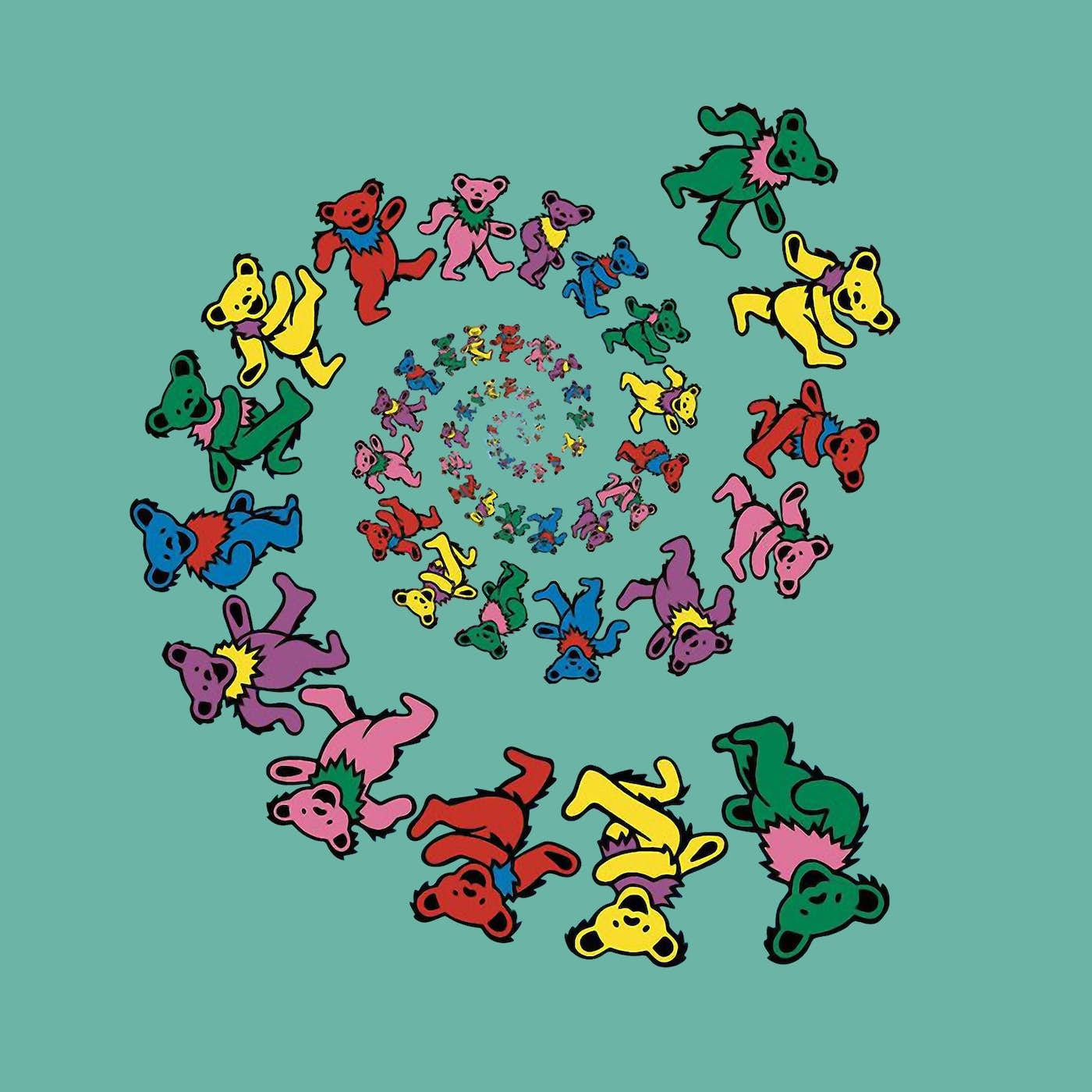
We’re about to witness a psychedelic meltdown of pop music.
In 1965 a bluegrass band in San Francisco got turned onto acid and it defined not just their career, but the future of music that’s about to unfold.
The Grateful Dead showed up to venues without a setlist or plan.
“I love the interview with Branford Marsalis, reflecting on the first time he sat in with the Dead on 3.29.90. Before he went onstage with them for the second set, he asked Jerry, "What will we be playing?" and Jerry replied, "Oh, I have no idea, we'll figure it out when we get out there." Branford said he walked out in front of 15,000 screaming fans and thought, "Wow, the audience has no idea what's about to happen, and the musicians onstage have no idea what's about to happen. This is really exciting."
What ended up happening was a 90-minute seamless set of music, where one song segued into another, without a break, covering a lot of musical and emotional territory.
Branford said it reminded him of why he even wanted to play music in the first place. Total risk, total payoff.” — YouTube comment
They’d start the show, start tripping, and things would take unpredictable directions. Their songs would mutate into each other, melt into primordial goo, take on new structures, and somehow come back together. It was a different experience each night. Sometimes a song would be 3 minutes, sometimes 45, and any song has hundreds of distinct live versions.
Now it all makes sense. As I binged the AI Beatles on YouTube, there’s regularly a “sounds like the Dead,” comment.
AI is about to do to all bands what acid did to the Grateful Dead.
In the 1990s, Terence McKenna said:
“Computers are like drugs, you just can’t swallow them yet.”
Technology is putting music through a process of “oozification,” a phrase coined by
. He says that technology causes stable forms to dissolve into miniature fragments that can be recombined in infinitely new ways. This challenges the things we once held sacred. The song, the catalog, and the band itself, each defined by its boundaries, its rules, and its scarcity, are all about to get oozy. This sounds scary and unfamiliar, but it’s already happened. The Grateful Dead were the “band of ooze.”So chill out, because AI is going to turn all bands into jam bands. This might be the ultimate comic relief of our technology paranoia. The machines are just trying to noodle.
The Grateful Dead are also a model to show us the kind of cultures that emerges around oozy music. An extreme abundance of songs doesn’t lead to meaninglessness; it fosters hardcore fans. AI music will bring us Beatle-heads, Swifty-heads, Drake-heads, and Talking-Heads-heads. What makes a “deadhead” different from a casual fan is their degree of participation.
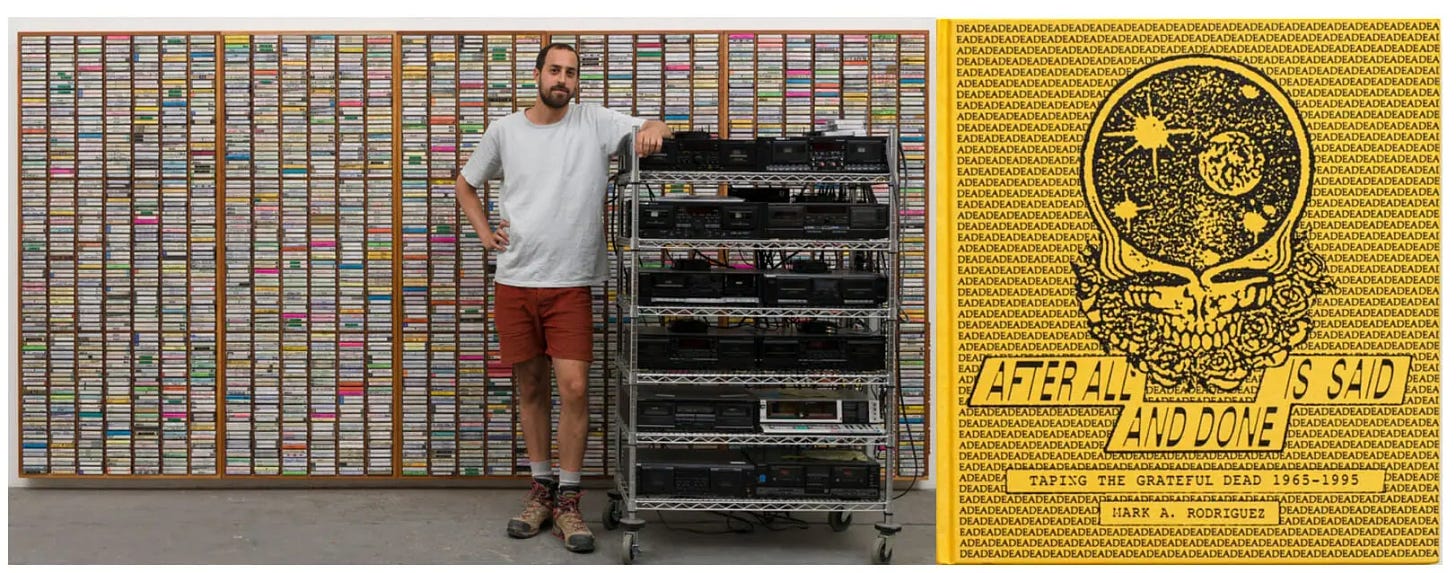
Many deadheads took it upon themselves to use tape recorders to capture each night. The band setup special sections for the bootleggers, relying on their fans to capture, curate, and distribute their uncontainable explosion of new music. One of their most prominent collectors Richard Allan “Dick” Latvala. He ended up becoming the bands’ official archivist, and the band worked with him to release 36 live albums, known as “Dick’s Picks.”
Another fan, John Oswald, clipped together 100 fragments from live recordings of Dark Star spanning from 1968 to 1993, to create a “Grayfolded.”
Deadheads were collectors, curators, and remixers. Many of the live versions were better and substantially different from the album version. A deadhead might say something like, “Man, Jerry’s solo in the 8/5/74 version was <extraterrestrial>.”
Over three decades, the Grateful Dead played 2,350 shows, which comes out to over 7,000 hours of music, or 293 days straight. By comparison, The Beatles whole catalog is only ~10 hours long, with live versions being more or less the same as their albums. The original Beatles were not oozy, but the AI Beatles will be.
The crazy thing here is that AI will make the Grateful Dead’s catalog appear very, very small.
Enter: the Dadabots. On April 6, 2021, they initiated the big bang of funk. NO SOUL has been improvising funk for 940 days straight. A synthetic jam band on an Infinite Radio station has already jammed 3x longer than the entire career of the Grateful Dead.
You can imagine someone will, without permission, create an Infinite Radio for each of the 213 songs in the Beatles catalog (this someone might be me). If each song ran in parallel, and if they were shaped to create distinct 3-minute songs, then this one person would generate 37 million new Beatles songs per year.
This is reckless abundance. It’s more music than anyone can ever listen to. I can barely keep up with my Discover Weekly playlist on Spotify. In a world of Infinite John Lennon, with billions of songs coming out per year, how will anyone find anything worth listening to?
Fan Fiction Markets_
Even if the supply of Beatles tunes balloons to unimaginable scales, demand is fixed. If some troll creates a black hole of Wild Honey Pie, you don’t have to know about it.
Matchmaking through markets will let people find what they want. For example, if you’re convinced that I could be your curator of emerging Beatles songs, you could just subscribe for “Dean’s Picks” and trust me (Substack spinoff coming soon). Maybe I’ll listen to 100s of new AI Beatles songs each week and send you a weekly EP of the best 6. I might be a breeder and a lyricist too. You’ll get a blend of spook rock, conspiracy themes, bluegrass, hypnagogia, cyberpunk, and baroque-folk. That’s my slant on the AI Beatles.
If you don’t want my slant, you can check out an open market. This already exists on Wattpad, where young people upvote and downvote 1,000s of Beatles stories. Each story has multiple tags, some of which include: “romance,” “angst,” “vampires,” “gay,” “gay with Bob Dylan,” “adoption,” “time travel,” “Rubber Soul,” “daddykink,” “smuttyfanfic,” and “diapers.”
There’s even a story called “Wild Honey Pie,” which is surprisingly non-erotic.
AI will bring an explosion of segmentation to Beatles masters that are passable as real songs. Our mono-music-culture was at it’s peak in 1964 when 38% of Americans tuned in to watch the Fab Four on the Ed Sullivan Show. Since then, it’s been a genre explosion. Today, only 5% of Spotify listeners listen to the Beatles.
Generative AI will turn every artist into a fractal explosion. You’ll witness all of the segments of culture within any given artist. There will be as many competing versions of the Beatles as there are niches in culture: you’ll have the breakup Beatles, the birthday song for your kids Beatles, the bukkake Beatles, the Beefheart Beatles, the benzedrine Beatles, the Yacht Club Beatles, the death metal Beatles, the Grimace for President Beatles, the anti-abortion Beatles, the Fake Plastic Paul Beatles, the Lil Wayne Beatles, and most troublesome, the Nazi Beatles.
Pre-ooze, the Beatles were a group of 4 guys. They had total control of their catalog. They broke up because they couldn’t agree. Moving forward, disagreement will be the primary feature of every catalog. We’re about to see an infinite regression of the White Album (an album with such a disassociated collection of songs, that they chose to leave the cover blank.)
If artists want any control over this phenomenon, it’s up to them to create their own market, control demand, and empower their own fans. We’ve already seen this in the pre-AI era. Radiohead released stems of their song Nude in 2008, challenging their fans to create remixes, hosting the best versions on their website. Taylor Swift hosted cover competitions over the radio and invited the winners backstage.
New artists can involve their fans by releasing AI tools along with their albums; this is exactly what Grimes did. She released a platform called “elf tech” where fans could make songs using her voice and aesthetic. She’s even made a Spotify channel called “Grimes AI” to promote fan creations, organized it through a blockchain, and shares royalties with them. The Grimes main account has 6 million monthly listeners, and the Grimes AI account is in the six figures! As of May 2023, there were 3,632 daily average users creating 250 songs per hour.
1 in 40 Grimes listeners will listen to AI variations.
1 in 2,000 Grimes listeners will join the band.
Grime-heads are growing her catalog 10x faster than anyone can listen to it.
Music is meant to be extended.
Join the Band
The history of music and the trends of the Internet show us that insane volume won’t destroy music culture, it’ll empower it. Beatle-heads will extend the lore, extend the catalog, and create new subcultures. It’s not good or bad, it’s a jarring shift from a finite game into an infinite game.
The Beatles have 30 million monthly listeners on Spotify. Maybe 98% of them won’t see the AI Beatles as legitimate, but that 2% could be a million-person market. They’ll treat the collective as seriously as an up and coming indie artist. If 1 in 2,000 fans contribute to their catalog (like Grimes), that means there could be 15,000 Beatles creators. I’ll probably be one of them.
Before the pandemic, I saw myself more as a songwriter than an essay writer. That shifted in the last three years. Similar to how this essay took 20+ hours to produce, so did a song. I made the hard decision to give up songwriting so I could focus all my energy on writing online.
But if I had Lennon-McCartney in my pocket, and George Martin waiting for me on a server for $9, and I could conceive, write, and release songs in 45 minutes, all through a process that involved me playing the instruments in my closet, maybe I could be prolific, unleash my imagination, and honor my passion for music, even though it’s just a hobby.
One day I’ll finish the Sgt. Peppers Spook Opera.
Let’s riff:
Favorite Beatles Song? (or, how many times did you listen to Wild Honey Pie?)
Would you be a troll, a curator, a breeder, a lyricist, or a song shaper?
What unresolved questions do you have?
Consider checking out the work of the people who helped me make this:
and — Their skepticism around AI music helped me shed through 7 drafts. They asked the right questions, brought the past to the surface, and helped me find a convincing angle. Yehudis just dropped an essay called Strangers with Benefits that will get you reflecting on all those brief but profound encounters in your life. Also, decided to make his logging practice public (the log mafia is brewing…). helped weave the personal angle throughout. helped me double down on the jam band angle. (and ) helped me shed an older intro. affirmed my new intro, and gave me the advice I needed to write the conclusion. brought the jokes for a title brainstorm (other options included “Strawberry Fields Forever, Forever,” “Sgt. Peppers Infinite Recursion Club Band,” and “Twist and Shout into the Void.” Also, helpful brainstorms with on the infinite and on the nature of AI tools.I also want to thank some friends who helped develop these ideas in talks and early drafts that go back to May of 2022:
Footnotes:
I recently learned that additional tracks were added to the White Album to fill a song quota and get out of a contract. Wild Honey Pie was a 5-minute studio experiment, the quintessential dick around. John wanted to put this on an album called “Paul Gone Too Far.” What’s pretty messed up is that some legit George Harrison recordings were omitted from the White Album, but this bizarre demo made the cut because George’s wife, Patti Boyd, “kind of liked it.” The Beatles didn’t break up because of Yoko Ono. The Beatles broke up because of Wild Honey Pie.
The Beatles were not just artists, but trolls. Knowing that people over-interpret the meaning behind songs, they peppered hundreds of “Paul is Dead” clues in their later albums. The funniest explanation I’ve heard is that it was a marketing kill switch. The mid-career Beatles were exhausted and wanted to stop touring, but their manager was worried that revenue would dry up. All they had to do was release a rumor to turn fans into detectives. It worked. Right before Abbey Road was released (the one where Paul is barefoot) a college student went on air and unpacked the whole theory, creating worldwide panic. Was it a plant? If true, genius. Abbey Road nearly exceeded the sales of their prior 3 albums combined.
A friend who is studying memoirs asked if The Memoirs of Billy Shears is any good, to which I replied: “lol it's so fucking bad. i wish it were good. the lore is bizarre and captivating, but it reads like a 4th grader wrote it. i want to write the good version one day. it would actually be a quentin tarantino screenplay called "band of love" and it would be the bloodiest movie ever.”
AI Beatles songs through Jukebox are quite passable as embryonic studio experiments, where the lyrics aren’t fully written and the idea mutates in search of its final form.
The end quality of Jukebox is lower than AI Beatles sheet music (non-Beatle humans performing Beatles-like compositions) or AI voice filters (polished human music with a mere John Lennon vocal effect), but the key innovation is its ability to generate entirely new arrangements in the voice of the band. It’s a subtle but huge distinction. In this recording of Yesterday, a human is playing McCartney’s arrangement on guitar and singing with a John Lennon voice filter. It’s a neat trick and sounds clean. By contrast, this Jukebox demo of Yesterday is something entirely new. It’s a creative contribution, albeit, machine-generated.
It’s possible I have a heightened appreciation for these demos because of my time as a songwriter. My band would jam for 3 hours and completely black out after. Thank god we recorded it. I’d listen back to every session, wait through the noise and bad takes, to eventually find rare moments worth keeping. “Ah! 43:52. That bass line!” I’d chop up our audio files, bring them back to the band, and we’d start jamming on the best accidents from the last time. Songs were born. AI recordings are similar: in a sea of noise, there are seeds of brilliance.
The irony is that commercial pop is already generated by a hit-machine: Dr. Luke. If you didn’t know, the same person wrote Katy Perry's "I Kissed a Girl", " Britney Spears’ "Circus," Miley Cyrus’ "Party in the USA" and Kelly Clarkson’s "Since U Been Gone.” The hits are already formulaic.




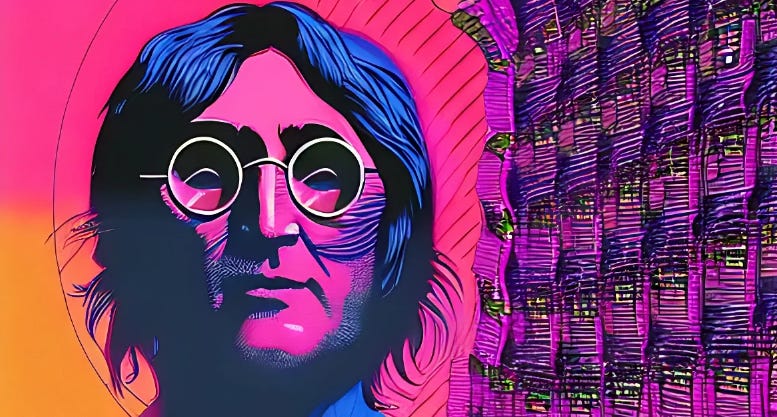
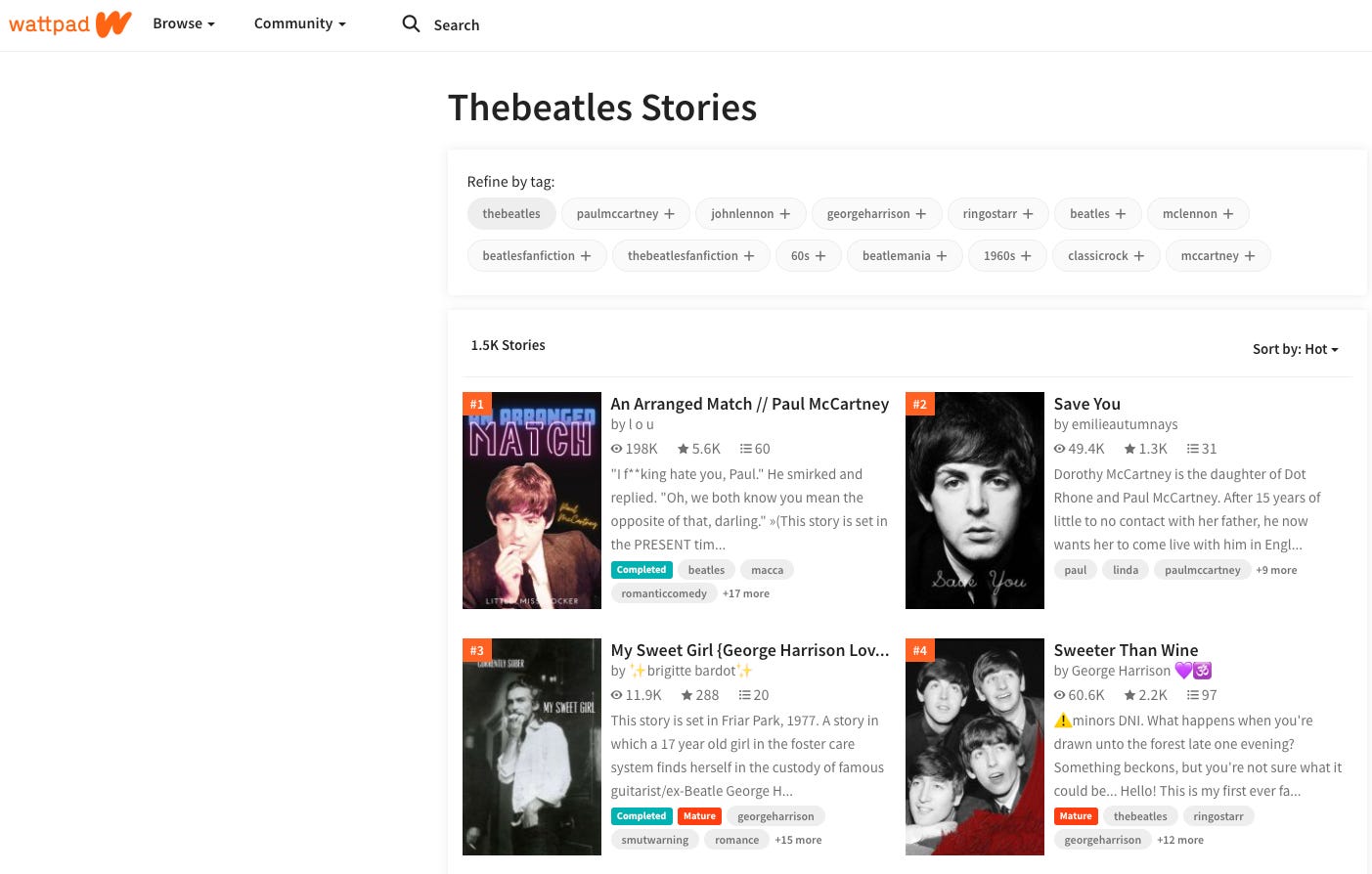
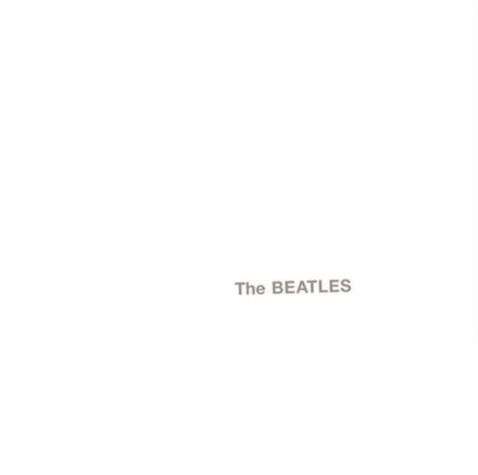
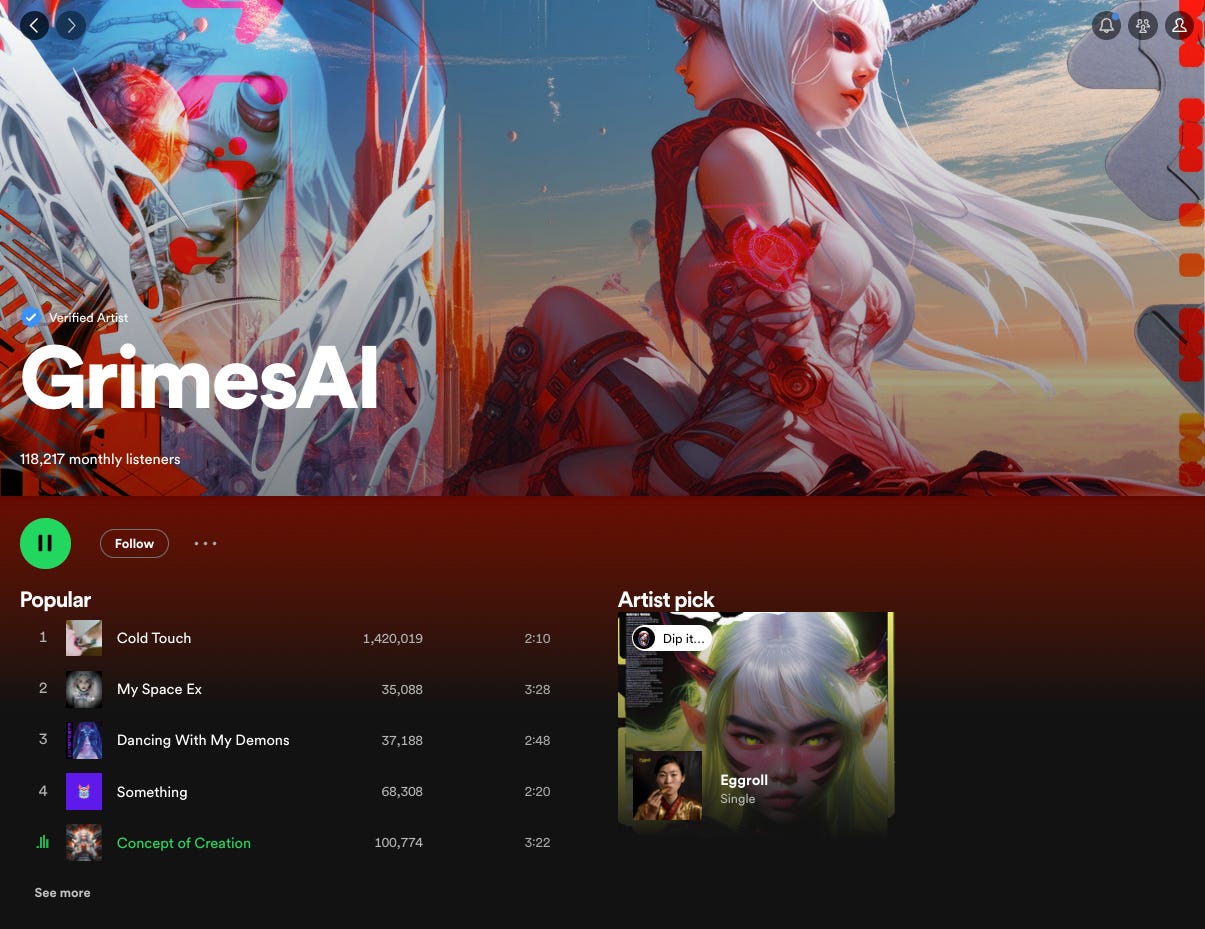
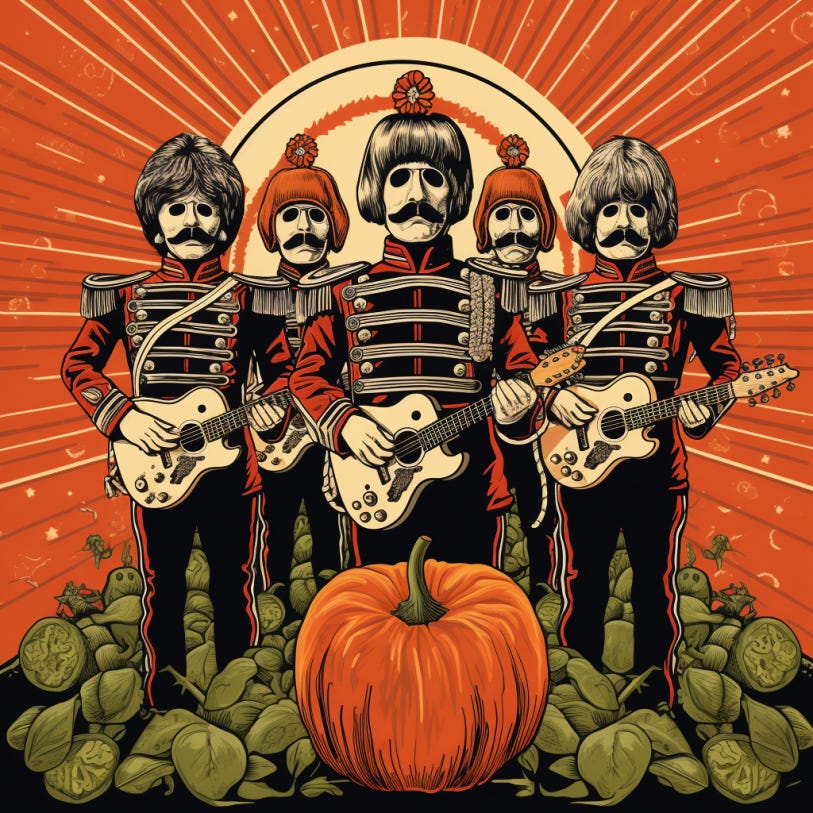
...you made me optimistic about some aspect of A.I. which i didn't think was possible...you made me think that there is some future Beatle's song that might be as good as Octopus's Garden...and you have definitively made me crave and be horrified of the prospect of entering some sort of demonic robotic k-hole where a hybrid Beatles and Grateful Dead cover band is fronted by the derelict corpses of the Rock-Afire Explosion, playing an infinite symphony of destruction for my melting mortal mind...i am most nervous about what this means for the infinite Carrot Top request i put into GPT a few weeks ago...great read...the fake peppers is incredible...bravo...
Wow. I've thought some about A.I. and art and A.I. and writing, but not A.I. and music. I don't know much about musical composition or notation, so that may be why. This is extremely interesting and, as always from you, Michael, superbly written. I'll be giving this a second read and some more thought.